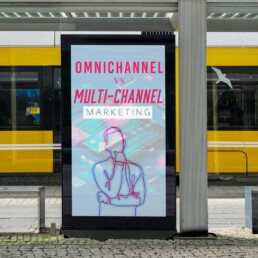Discover Seamless Omnichannel Marketing with Triangle Direct Media
Enhance your brand's reach through CTV, social ads, Google and Bing ads, retargeting, content creation, and SEO
What is Omnichannel Marketing?
Omni-channel marketing involves the integration and coordination of various channels that businesses use to engage with consumers. The primary objective is to create a cohesive and seamless brand experience across all touchpoints. This approach encompasses physical locations (like stores) and digital platforms (through connected TV advertising, social ads, Google and Bing ads, retargeting content creation, and SEO). The aim is to provide consumers with a convenient and unified experience, whether they choose to shop online, in-store, or through a combination of both, such as “buy online, pick up in-store.”
Businesses across multiple industries—including retail, healthcare, finance, and technology—are increasingly adopting omni-channel strategies. This trend is driven by the modern consumer’s demand for real-time information and the flexibility to interact with brands on their own terms.
The Core of Omnichannel Marketing with Triangle Direct Media
Omnichannel marketing integrates branding, messaging, and touchpoints (both online and offline) throughout the consumer’s journey. This approach ensures a more impactful and cohesive customer experience. By focusing on the consumer’s perspective, omnichannel marketing creates a consistent and positive interaction at every touchpoint.
Key elements of omnichannel marketing include:
- Consistent and Recognizable Brand Tone and Vision: Maintain a unified brand voice across all channels to build trust and recognition.
- Personalized Messaging: Tailor messages to individual interests to enhance relevance and engagement.
- Relevant Content: Provide content that reflects previous interactions and aligns with the current stage of the buyer’s journey.
These elements help build brand recognition and foster engagement by delivering personalized experiences based on consumers’ preferences and shopping history.
Ready to elevate your marketing strategy? Contact Triangle Direct Media today to launch a successful omnichannel ad campaign and achieve outstanding results!

Omnichannel vs. Multi-Channel Marketing
While both omnichannel and multi-channel marketing involve engaging consumers across multiple platforms, they are fundamentally different. Multi-channel marketing focuses on individual channels and how transactions are completed within them. In contrast, omnichannel marketing considers the entire customer journey across multiple channels to create a seamless and integrated experience.
- Multi-Channel Marketing: This strategy involves distributing content and advertisements across various platforms, allowing consumers to choose where they interact with the brand. However, these interactions are often siloed and not interconnected.
- Omnichannel Marketing: This approach ensures a unified and integrated experience across all channels. It considers that consumers may switch between devices and platforms and ensures that each transition is seamless and informed by previous interactions.
Benefits of an Omnichannel Approach
Implementing an omnichannel strategy, though complex, offers numerous benefits:
- Enhanced User Experience: Focusing on the individual experience across devices rather than the channel itself improves overall customer satisfaction, driving higher sales and retention rates.
- Cohesive Brand Strategy & Identity: A seamless strategy across channels helps build a consistent brand image and tone, fostering brand loyalty and targeted messaging.
- Increased Revenue: An omnichannel approach encourages consumers to engage with the brand across multiple touchpoints, increasing the likelihood of conversions and repeat purchases.
- Better Attribution Data: By tracking engagements across channels, brands gain valuable insights into the customer journey, enabling more targeted and effective campaigns.

What is Omnichannel Attribution?
In an omnichannel environment, multiple touchpoints contribute to a conversion. Omni-channel attribution involves understanding and crediting each touchpoint’s role in the consumer’s journey. This approach provides a holistic view of the marketing funnel, allowing for more accurate measurement and optimization of campaigns.
Steps for Implementing an Omnichannel Strategy
- Data Collection: Gather accurate and timely data on consumer interactions across all channels to understand their preferences and behaviors.
- Data Analysis: Use analytics platforms to translate this data into actionable insights in real-time, allowing for campaign adjustments as needed.
- Customer Journey Mapping: Create detailed maps of the customer journey for each audience segment to inform targeted campaigns.
- Brand Guidelines: Develop and adhere to clear brand guidelines across all channels to ensure a consistent and recognizable brand identity.
- Testing and Optimization: Continuously test and optimize the omni-channel approach to improve campaign effectiveness and ROI.
Industries Applying Omnichannel Tactics
- Retail: Integrating online and in-store experiences to meet consumer expectations for convenience and real-time information.
- Healthcare: Enhancing patient engagement by analyzing interactions across various healthcare touchpoints.
- Automotive: Engaging potential buyers through a comprehensive strategy that spans online research and in-person visits.
- Financial Services: Shifting to a customer-centric approach to deliver personalized experiences and gain insights into consumer preferences.
Trends in Omnichannel Marketing
- Integration of In-Store and Online: Offering seamless transitions between online and offline shopping experiences.
- Focus on the Brand, Not the Channel: Maintaining a consistent brand identity across all touchpoints.
- More Devices for One Purchase: Addressing the trend of consumers using multiple devices during their shopping journey.
- Multiple Channels Mean Better Customers: Recognizing that customers who interact across multiple channels are more valuable and tend to spend more.
Triangle Direct Media aims to provide a unified and engaging customer experience across all touchpoints by adopting an omnichannel marketing strategy. Our approach—encompassing connected TV advertising, social ads, retargeting, Google and Bing ads and shopping, content creation, and SEO—helps businesses achieve better customer satisfaction, increased revenue, and more effective marketing campaigns.
Still, trying to convince yourself or other decision-makers about the importance of having an omnichannel marketing strategy? See these key points to help to make the move to elevate your business:
- Increased Customer Retention and Engagement: Omnichannel marketing helps brands engage customers seamlessly across multiple touchpoints, leading to better retention. According to an Omnisend report, customer retention rates are 90% higher for omnichannel strategies compared to single-channel strategies.
- Higher Purchase Frequency: Omnichannel shoppers tend to purchase more frequently. A study by Harvard Business Review found that customers who engaged with multiple channels spent 10% more online and 4% more in-store than single-channel shoppers.
- Better Customer Experience: Delivering a unified message across platforms ensures a consistent customer experience, which drives loyalty. According to Aberdeen Group, companies with strong omnichannel customer engagement strategies retain 89% of their customers, compared to 33% for companies with weak omnichannel strategies.
- Boost in Revenue: Omnichannel marketing directly impacts revenue growth. According to Omnisend, brands using omnichannel strategies achieve a 287% higher purchase rate than those using a single-channel approach.
- Increased ROI from Campaigns: By unifying messaging and targeting across channels, brands see improved return on investment (ROI). ClickZ found that businesses with omnichannel strategies saw a 13% increase in campaign performance compared to single-channel efforts.
GETTING STARTED
Leverage Triangle Direct Media's extensive experience across diverse retail sectors and geo-fencing capabilities to provide you access to omnichannel marketing at scale. No hassle, No-obligation
